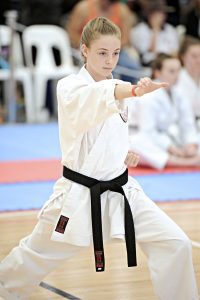Performing Your Best Kata When It Counts
“I know some people do not think too highly of tournaments and that is fine. Yet for me, apart from the enjoyment I get, tournament kata is an essential part of developing yourself as a martial artist. I say this because it is the truest test of your ability to control your emotions and thoughts. Stepping out in front of a huge crowd and to be judged is the ultimate test of courage and focus. You cannot get such a challenging environment in the dojo or during home training and I admire anyone who enters a tournament, irrespective of the result.”

Prior Preparation Prevents Poor Performance
Always warm up well before your division is called and continue until you’re happy with your flexibility level. Work on various combinations in the Kata and go through the entire Kata at least once. Don’t worry about making last-minute fixes in warming up because you will concentrate on the area you need to fix instead of performing all moves perfectly.
It’s The Practitioner, Not The Kata That Wins
Only perform the Kata you know very well. Doing a lower grade kata skilfully is better than an average higher grade kata. Perform the best Kata you know. This will ensure that you have the correct technique and are comfortable with the rhythm of the Kata. If you don’t know which is your best Kata, ask your instructor before or after class. Usually, it’s the Kata you can do with your eyes closed, in reverse, at a strange angle or on any surface. Never change Kata amid competition; for instance, if you’re in a tiebreaker at the finals and your competitor does the same Kata as the one you planned to do. Many titles have been lost because of the change in Kata at this time. It’s best to perform the Kata you planned to do because you are more comfortable with it. Instead of seeing the situation as a problem, look at it as an opportunity to show the judges how your version of the same Kata is much better. In GKR competitions, judging depends mostly on technique, especially at the beginner to intermediate levels. In the Opens, technique is expected, so judges tend to score you severely for any incorrect technique. They will also look for the power behind your techniques, your ability to be both sharp and smooth, your focus, balance, understanding and most importantly, the finesse with which you perform the Kata.
Don’t Make It More Than What It Is
Some people focus on everything around them on the day: the crowd, the judges, the occasion, etc. Let it go! It is pretty simple. You have been practising your Kata for some time. So warm up, and then go in the ring and execute all those fast moves the fastest, sharpest and snappiest you can. And as for the slow moves, perform them slowly, smoothly, and gracefully. And always, always be relaxed in between moves. It is no different to training, except for the tricks your mind plays on you because of the atmosphere in which you perform. But in the end, it’s just another day of you performing your Kata the best way you can and interpreting it to the best of your ability.
The Person Who Goes First Never Comes First
Does it matter if you are first up, last, or just after someone who always does well in Kata? Will it help you do a great kata? No! Your mind will be focusing on worrying about the performance of the people before or after you, which is miles away from what you should be thinking. The person to walk away with the gold will be the person who managed to best focus on their Kata and then perform it to their best. So, do not allow the situation to determine whether you will win your division.
Get In The ‘Zone’ And Deal With Nervousness
Focus on the Kata. Never focus on a negative result. Focus on the Kata and be in the moment. Take control of your emotions. It is okay to be nervous; everyone gets anxious. Accept the feeling and let it go. Tell yourself, “My thoughts and feelings do not reflect reality”. Your thoughts and feelings are your interpretation of the situation. It has nothing to do with reality. Close your eyes and take deep breaths while waiting for your name to be called. This will make you feel more grounded and in control. The more you practise this when performing your Kata in class, the more accessible performing in competition will be. In the last couple of years, I’ve noticed that it doesn’t matter who the judges are, who you’re competing against, and in what order you have to perform. Besides the fact that it is too stressful to try to control every situation, in the end, all you have complete control over is yourself. So take control of your mind, focus and expect the best!
Angela Uytingco
Related Articles
Returning To Karate Training After A Break
Why Kata Is An Integral Part Of Karate



